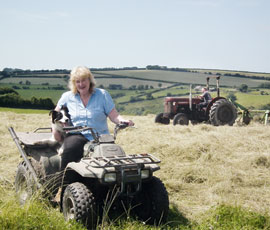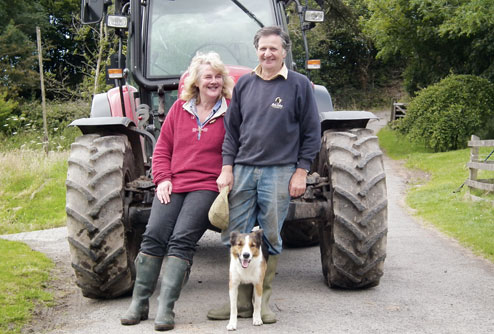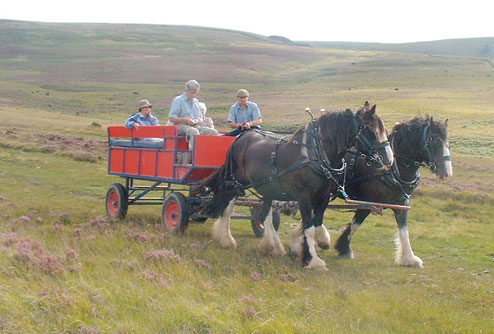Farm and books: diversification with a difference

Farming and writing go hand-in-hand on one farm in Exmoor. Victoria Eveleigh tells the story of her diversification with a difference
“You’d never guess it to look at her, but Victoria Eveleigh was brought up in London,” read my introduction from the literary festival programme.
I don’t know what my audience was expecting, but I did my best to look like an author (rather than a feral prolific ewe-woman) and talked about how I became a farmer and writer.
Although I was brought up in London, I spent as many holidays as possible on my grandmother’s farm on Exmoor. To me, it was a paradise of dogs, horses and tame lambs, and from an early age I wanted to be a farmer. However, with no land and no real knowledge of agriculture it was going to be difficult – unless, of course, I married a farmer.
With this in mind, I set my sights on agricultural college, but my cunning plan was thwarted by the school careers teacher who said girls didn’t do agriculture and I should do a degree in something sensible like geography.
Soil sciences were a big thing at the University of St Andrews, which meant I was able to sneak a fair amount of agriculture into my geography degree without anyone objecting. My dissertation involved digging holes in fields, analysing the soil and then giving the owner a huge questionnaire to fill in. Unfortunately there were no proposals of marriage from my farmer victims (having been on the receiving end of many research questionnaires from students over the past 30 years, I can understand why.)
Undaunted, I went for plan B: Wye College in Kent. This proved fruitless, too, as far as finding a husband with acres was concerned. The fact I was the only girl on my course was actually a disadvantage because I was treated like one of the lads. By the end of the year I had an MSc in agricultural economics, some good friends and a beer belly.
While looking for a job afterwards, I stayed at grandma’s farm and worked as a waitress in a hotel. Soon I was also working part-time for the Exmoor National Park Authority, and somewhere along the line I acquired a horse. Slowly but surely it became impossible to leave Exmoor, especially when I met a handsome young farm manager who lived about four miles away. He was that rarest of things: a farmer who loves horses.

Grandma’s farm is now our farm, and we’ve been here for over 25 years. At 240 acres (97ha) it’s fairly small for a hill farm, so we’ve tried several different things to make ends meet: a self-catering holiday cottage, horse-drawn tours over Exmoor with Shire horses, Land Rover tours of the farm, organic farming, cream teas, renewable energy and books.
The books developed almost by accident, but they’ve become by far the most successful thing we’ve done – even though they’re not what usually springs to mind when thinking about farm diversification.
“I have to treat writing like a proper job now, and I’ve visited London more often in the past year than in the previous ten.”
Victoria Eveleigh
Foot-and-mouth
Most people remember 2001 as the year the Twin Towers were destroyed. Livestock farmers also remember that year because of the foot-and-mouth epidemic.
We never got foot-and-mouth on our farm, but it came far too close for comfort. We were desperate not to get it because our pedigree Exmoor horn sheep and Devon cattle have been bred in an unbroken line on this farm for more than a hundred years, so we battened down the hatches and only went out to the nearest town when we had to.
For nearly half a year we closed the self-catering cottage and horse-drawn tour businesses, and the children stayed at home for the whole of the spring term. It was an extraordinary time, and the worry of not knowing what would happen next was intense, but in some ways it was a holiday from all our usual commitments. For the first time since we were married, we had time to spare. Chris took up drawing and painting while I sat in the farm office and wrote the book that had been forming in my head for several years: the story of a girl and an Exmoor pony growing up on an Exmoor hill farm.
Full of optimism, I purchased a copy of The Writers’ And Artists’ Yearbook and started writing to agents. After several months I’d received polite rejections from some and no communication from others. Utterly disheartened, I nearly gave up completely, but then a friend suggested I should publish the story myself. She’d published her own books in the past, and said all I needed to do was register myself as a publisher, get someone to design the layout of the book, get a printer to print it and some people to buy it.
Farmers are used to dealing with bulky items but, even so, it was a shock to see how much space 6,000 books took up when they were delivered to our house by the printers. Too late, I realised I knew nothing about selling and, being typically British, I didn’t feel comfortable promoting myself. However, with the prospect of never being able to use the sitting room again spurring me on, I loaded some books and leaflets in the car and went for a drive around the Exmoor area. There weren’t many actual bookshops but there were gift shops, tourist attractions and tack shops, so I had more outlets than I’d realised. In fact, my best customers turned out to be places which normally didn’t stock books – I’ve found the quickest way to get depressed is to visit a large bookshop and see how many different books there are, all vying for attention.

Probably due to Chris’ illustrations, the first book sold so well that I had to do another print run, and I was encouraged to write a sequel. Now I had stacks of books and a bit of money, so we converted Chris’ work shed into a farm office where I could store both the books and the ever-increasing quantity of farm records. At last I had a warm purpose-built room where I could write books and deal with the paperwork for the farm and publishing businesses.
We made the Exmoor pony story into a trilogy, wrote and illustrated a colouring book about the farming year for the Exmoor Horn Sheep Breeders’ Society and then published a story set on the island of Lundy.
Several things had been happening during this time, but they’d happened so slowly that I didn’t notice straight away. The economy slowed down, then went into recession; fuel and postage prices went up, squeezing margins because books are typically delivered for free; paper and printing costs increased, and large bookshops and online stores started a vicious price war. Simultaneously, the whole book industry was going electronic.
On the verge of quitting
I’d more or less decided to quit while I was ahead when I received an email from a lady who runs a website called Lovereading4kids. She’d read my Lundy book and wanted to make it a book of the month on her website and, to cut a long story short, through her I was taken on by Orion Children’s Books just over a year ago.
Since then my life has changed. I have to treat writing like a proper job now, and I’ve visited London more often in the past year than in the previous ten. I’ve re-written my existing stories (which have been published as Katy’s Wild Foal, Katy’s Champion Pony, Katy’s Pony Surprise and A Stallion Called Midnight) and I’m writing a new trilogy for publication in 2013. It will still have horses and the countryside at its heart, but it will have a boy as the main character for a change. Chris is still doing the illustrations for my books – so I’m now a proper author and he’s a proper illustrator.
More time spent writing inevitably means less time for farming. I still do the farm records and accounts, help with things like TB testing and clean the self-catering cottage on changeover days, but the everyday farm work is now up to Chris together with our daughter who’s working here part-time.
It can be quite a juggling act. As with most farms, the telephone never stops ringing and people are always dropping in, so I find the best time to write is at night. Visitors who knock on the door at eight o’clock in the morning, to be greeted by a bleary-eyed farmer’s wife, don’t realise I went to bed at three.
However, I wouldn’t turn back the clock for anything. I love writing and I’m so glad I’ve been given this fantastic opportunity to turn it from a hobby into a whole new career. An added bonus is I get paid beforehand for each story I write. Chris often has to get his own lunch and do more housework nowadays, but in our farmyard there’s a new red tractor called Advance.
| Victoria’s diversification do’s and don’ts |
|---|
| Do something you enjoy We explored the possibility of crayfish farming at one point, but decided we really couldn’t get enthusiastic about crayfish. Do something that makes use of what you’ve got. We have a large Devon longhouse and we’re in Exmoor National Park, a few miles from the North Devon coast, so it made sense to split the house in two and make the side with the good views into a self-catering cottage. Do something that will make enough money to be worthwhile. This may seem obvious, but the horse-drawn tour business we ran for many years rarely made much of a profit although we really enjoyed having the horses and doing the work. If we’d charged our time by the hour it would have made a thumping loss. We eventually gave up the enterprise because we realised our time would be better spent doing other things. Do be aware of the tax implications of any diversification scheme. Farming enjoys many tax benefits which other businesses don’t enjoy, and if your diversification is successful it could have serious tax implications, especially if it becomes the main business. Also, be aware that most businesses will be business-rated, although this could work in your favour. For instance, our holiday cottage is business-rated but it qualifies for small business rate relief, and the fact there is a business premises attached to the farmhouse has lowered the council tax considerably, so we’re actually better off paying business rates than we would have been paying a much higher rate of council tax on the whole building. Don’t borrow large amounts of money to start a new enterprise unless you’re pretty sure it’s going to succeed. The idea of diversification is to make more money, not work harder to keep your bank in business. Don’t work yourself, or other members of the family, into the ground. If a new diversification requires a lot of work, the core farming business could suffer and it could cause friction. Make sure you have time to enjoy life as well. |
